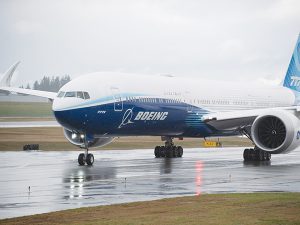Bloomberg
Boeing Co dropped as the planemaker recorded $5.5 billion in total costs for the 787 Dreamliner, wiping away any near-term profit for the marquee wide-body jet.
The charges also overshadowed some rare good news.
The aviation titan surprised Wall Street by generating cash for the first time since early 2019: $494 million in free cash flow in the fourth quarter. The cash inflows should strengthen this year and next as Boeing accelerates deliveries of its 737 Max and restarts Dreamliner deliveries, Boeing’s Chief Financial Officer Brian West said during an earnings conference call.
The planemaker has burned through more than $31 billion during a nearly three-year-long slump marked by the Max’s grounding, the Covid-19 pandemic and a spate of quality lapses. The Dreamliner has emerged as an expensive stumbling block, although executives insisted the latest disclosure reflects the cost of widespread repairs — and not a new structural glitch.
“None of us like charges,†Chief Executive Officer Dave Calhoun said in an interview on CNBC. “It’s a big one and it reflects our reality with the delays, the rework process we’ve been involved with and the time it’ll take to work the way through the process.â€
The 787 program’s profits have been erased as Boeing pays airlines for service they’ve lost because of delivery disruptions. The company hasn’t handed over any of the aircraft since June as it addresses a series of tiny imperfections on the carbon-fiber jet frames. Costs soared after Boeing determined that it needed to perform a labor-intensive fix involving the doors of the more than 110 aircraft in its system.
The size of Boeing’s Dreamliner tab spooked investors, said analyst Robert Spingarn Melius Research. “It’s a negative with a silver-lining positive in that it’s out of the way,†he said.
The Chicago-based company narrowed its fourth-quarter loss to $7.69 a share, hit by the 787 costs. Revenue declined 3.3% to $14.79 billion, while analysts projected $16.7 billion, according to the average of estimates compiled by Bloomberg.
The manufacturer lowered its total debt by $4.3 billion to $58.1 billion as it prepaid a term loan and repaid maturing debt. Cash and investments in marketable securities fell by $3.8 billion to $16.2 billion.
Boeing shares slid 2.8% to $198.30 at 1:52 p.m. in New York, logging the second-biggest drop on the Dow Jones Industrial Average. The company’s stock gained 1.4% this year, while the industrials slumped 5.6%.
The company declined to provide formal financial guidance for 2022, a contrast with suppliers such as Raytheon Technologies Corp. and General Electric Co., which offered forecasts when they reported earnings.
But Boeing revealed it has hiked output of its cash-cow 737 to 26 of the narrow-bodies a month, and is on track to reach its targeted rate of 31 jets in the next few months. The planemaker said it will carefully assess the health of its supply chain before pushing rates higher. Strains in the flow of engine castings and forgings is already a concern, Calhoun said.
Boeing has stashed 335 of its 737 Max jets and 110 Dreamliners around its factories or in arid parking lots. Clearing more of those jets from storage should help the company replenish its cash reserves and pay down debt.
The company recorded several 787-related charges and costs in the fourth-quarter after determining that resuming deliveries and clearing its inventory would take longer than expected. They included a $3.5 billion pretax, noncash accounting charge to cover compensation to Dreamliner customers. Under program accounting rules, Boeing won’t reap any profit from potentially hundreds of deliveries, although it will still pocket cash.
The company doubled so-called abnormal costs of estimated spending on Dreamliner inspection and repairs to $2 billion and signaled that the work will extend through the end of next year. Boeing wouldn’t say when it expects to restart deliveries.
“Here we go again. Just as we saw with the 737 Max, Boeing is now racking up massive charges on the 787 with no firm end in sight, and its fate in the hands of the FAA,†analyst Rob Stallard of Vertical Research Partners wrote in a note to clients. The uncertainty over the jet “leaves Boeing looking a far riskier aerospace play than other higher quality names in the space.â€
 The Gulf Time Newspaper One of the finest business newspapers in the UAE brought to you by our professional writers and editors.
The Gulf Time Newspaper One of the finest business newspapers in the UAE brought to you by our professional writers and editors.
